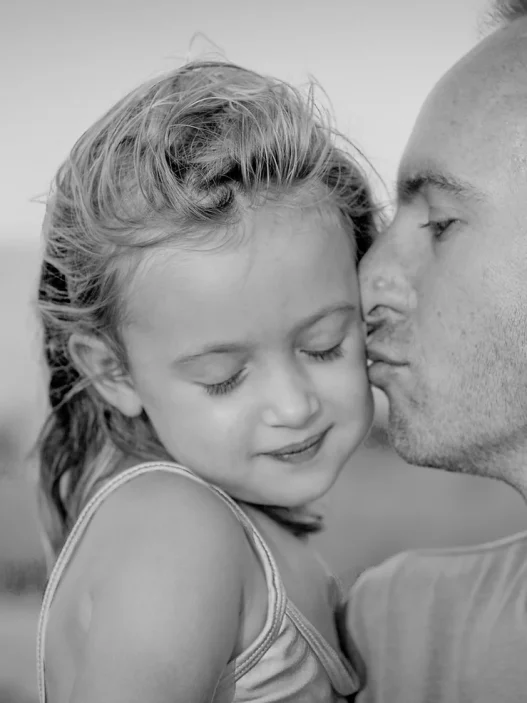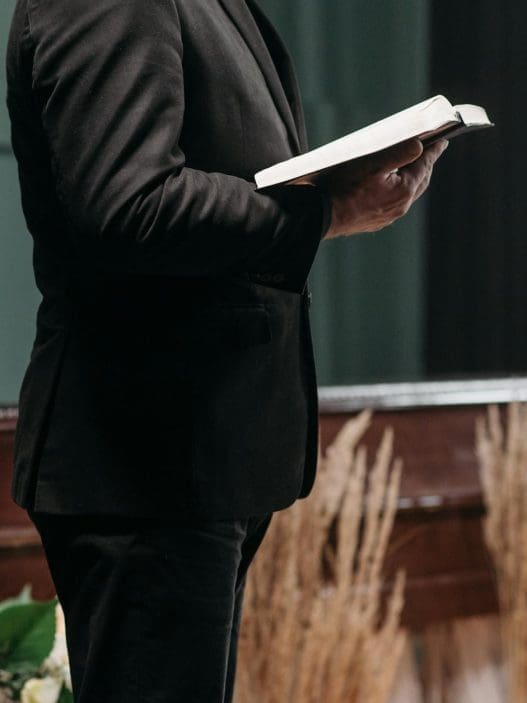Writing a eulogy for your father is a deeply personal and emotional task. It is an opportunity to honor his life, share cherished memories, and express your love and gratitude. Crafting a eulogy that truly captures his essence requires reflection, thoughtfulness, and a deep understanding of his impact on your life and others.
This article goes through the steps on how you can write the perfect eulogy for your father as well as how to structure the eulogy so that it flows. We have also shared an example of a put together eulogy which you can use and adapt for your own dad’s eulogy.

Table Of Contents
Steps to Writing a Eulogy for Your Father
Key Elements to Include in a Eulogy for your Dad
Additional Tips for Writing a Meaningful Eulogy
Example of a Eulogy Written For A Father
In-Depth Guide to Writing a Eulogy for Your Father
Advanced Strategies for Writing a Heartfelt Eulogy For Your Father
What Is A Eulogy?
A eulogy is a speech given at a funeral in commemoration of someone’s life. A eulogy serves several important functions:
- Honoring the Deceased: It celebrates your father’s life and acknowledges his contributions.
- Providing Comfort: It offers solace to family and friends by highlighting positive memories and shared experiences.
- Creating a Legacy: It preserves his story and ensures his memory lives on.
Steps to Writing a Eulogy for Your Father
1. Reflect on His Life and Legacy
Take time to think about your father’s life. Consider the following aspects:
- Early Life: His childhood, education, and formative experiences.
- Career and Achievements: His professional journey and accomplishments.
- Family and Relationships: His role as a father, spouse, friend, and relative.
- Passions and Interests: His hobbies, talents, and interests.
2. Gather Memories and Anecdotes
Reach out to family members, friends, and acquaintances to collect stories and memories. This can provide a broader perspective and uncover stories you may not know.
3. Organize Your Thoughts
Create an outline to structure your eulogy. A typical format includes:
- Introduction: Opening remarks and acknowledging the audience.
- Personal Reflections: Sharing personal stories and memories.
- Key Attributes and Achievements: Highlighting his character and accomplishments.
- Conclusion: Offering a final tribute and farewell.
4. Write with Emotion and Authenticity
When writing, focus on expressing genuine feelings. Use descriptive language to paint a vivid picture of your father. Avoid clichés and strive for authenticity.
5. Edit and Revise
Review your eulogy multiple times. Consider the following tips:
- Clarity: Ensure your message is clear and easy to understand.
- Length: Aim for a eulogy that is 5-10 minutes long when spoken.
- Tone: Maintain a respectful and heartfelt tone.
6. Practice Delivering the Eulogy
Practice reading your eulogy aloud. This can help you become more comfortable and confident in delivering it. Consider practicing in front of a trusted friend or family member for feedback.
Key Elements to Include in a Eulogy for your Dad
Introduction
Begin with a warm and welcoming introduction. Acknowledge the presence of family, friends, and guests. You might start with a quote, poem, or a simple statement of gratitude for those gathered.
Personal Stories and Memories
Share specific stories and memories that illustrate your father’s personality, values, and impact. Highlight moments that showcase his kindness, strength, and love.
Attributes and Achievements
Discuss your father’s key attributes and achievements. This could include his professional successes, contributions to the community, and his role within the family. Emphasize qualities such as wisdom, resilience, and dedication.
Expressions of Love and Gratitude
Express your love and gratitude for your father. Share what he meant to you and how he influenced your life. This is an opportunity to acknowledge his sacrifices and express your appreciation.
Conclusion
Conclude with a heartfelt farewell. You might end with a favorite quote, a personal message, or a simple thank you. Offer comfort to those present and reinforce the lasting legacy of your father.
Additional Tips for Writing a Meaningful Eulogy
- Be Honest: Share both the highs and lows of your father’s life, painting a balanced and true picture.
- Use Humor Wisely: Light-hearted stories and appropriate humor can bring comfort and a sense of warmth.
- Involve Others: Consider incorporating messages or quotes from other family members or friends.
- Stay Positive: Focus on the positive aspects of your father’s life and his legacy.
- Take Breaks: Writing a eulogy can be emotionally taxing. Take breaks to process your emotions.
Example of a Eulogy Written For A Father
Introduction
Good afternoon, everyone. Thank you for being here today to honor and celebrate the life of my beloved father, [Father’s Name]. Your presence is a testament to the love and respect he inspired in all of us. As we gather to remember him, I would like to share some of the stories and qualities that made him the extraordinary person he was.
Personal Stories and Memories
My earliest memory of my father is one that I cherish deeply. I was about five years old, and we were in our backyard on a warm summer day. He had set up a small picnic for us, complete with a checkered blanket and my favorite sandwiches. I remember the way he laughed as I told him a silly joke, his eyes sparkling with joy. This simple, yet profound moment, encapsulates the essence of my father—his ability to find happiness in the little things and his unwavering love for his family.
Growing up, my father was my rock. He was always there to support and guide me, no matter what challenges I faced. When I was struggling with school, he would sit with me for hours, patiently helping me with my homework. He taught me the value of perseverance and hard work, and I owe so much of my success to his dedication and encouragement.
Attributes and Achievements
My father was a man of remarkable strength and resilience. He faced numerous hardships throughout his life, yet he never let them define him. Instead, he used these experiences to grow and become even more compassionate and understanding. He had a way of making everyone around him feel valued and loved, always offering a listening ear and a shoulder to lean on.
In his professional life, my father was a dedicated engineer. He spent over 30 years designing and building bridges, bringing structure and safety to countless communities. His colleagues often spoke of his precision and expertise, and he was a mentor to many young engineers starting their careers. His passion for his work extended beyond his job; he volunteered his skills to help build schools and infrastructure in underserved areas.
Talking About A Passion
One of the fondest memories I have of my father is his unwavering support for his favorite football team, the [Team Name]. Sundays were sacred in our household, as they were reserved for watching the game together, a tradition he cherished deeply. He would don his team’s jersey, set up snacks, and cheer passionately, his enthusiasm infectious. Whether they won or lost, he remained a loyal fan, teaching me the value of dedication and loyalty.
His love for [Team Name] was more than just about the sport; it was about the community, the shared moments, and the joy of celebrating victories and enduring losses together. This passion for football was a significant part of his identity, bringing him immense joy and creating countless cherished memories for our family.
Expressions of Love and Gratitude
I feel incredibly blessed to have had such a wonderful father. He taught me so much about love, kindness, and the importance of family. His unconditional love and unwavering support have shaped me into the person I am today. I am eternally grateful for all the sacrifices he made to ensure I had a happy and fulfilling life.
One of the greatest lessons my father taught me was the importance of living with integrity and humility. He believed in treating everyone with fairness and respect, regardless of their circumstances. His legacy of honesty and empathy is something I strive to carry forward in my own life.
Conclusion
As we say goodbye to my father today, I find comfort in knowing that his spirit will live on in each of us. His love and kindness have touched so many lives, and his memory will continue to inspire us. I would like to end with a quote that I believe perfectly encapsulates his essence: “What we have once enjoyed deeply we can never lose. All that we love deeply becomes a part of us.” – Helen Keller.
Thank you, Dad, for everything. You will always be in our hearts.
In-Depth Guide to Writing a Eulogy for Your Father
1. Reflect on His Life and Legacy
Early Life
Begin by reflecting on your father’s early life. Consider his childhood, family background, education, and formative experiences. These early years often shape a person’s character and values, and understanding them can provide insight into who he was.
- Family Background: What was his family like? Did he have siblings? What were his parents like?
- Childhood: Where did he grow up? What were his favorite childhood activities?
- Education: Where did he go to school? Did he have any memorable teachers or experiences?
- Formative Experiences: Were there any significant events in his early life that shaped him?
Career and Achievements
Next, think about your father’s professional life and achievements. This could include his career, volunteer work, hobbies, and any other accomplishments.
- Career: What was his profession? What were his proudest achievements at work?
- Volunteer Work: Did he volunteer or participate in community activities?
- Hobbies and Interests: What were his passions and hobbies? Did he have any notable achievements in these areas?
Family and Relationships
Consider your father’s role within the family and his relationships with others. This is often the most personal and meaningful part of the eulogy.
- Role as a Father: What kind of father was he? How did he show his love and support?
- Relationships with Others: What were his relationships like with other family members and friends?
- Family Traditions: Were there any special family traditions or rituals he cherished?
Passions and Interests
Finally, think about your father’s passions and interests. These are often the things that brought him joy and fulfillment.
- Hobbies: What were his favorite hobbies? Did he have any special talents?
- Interests: What topics or activities was he passionate about?
- Legacy: How did his passions and interests influence others?
2. Gather Memories and Anecdotes
Collecting stories and memories from family members, friends, and acquaintances can provide a broader perspective on your father’s life. These stories can add depth and richness to your eulogy.
Reaching Out to Others
- Family Members: Talk to siblings, children, and other relatives.
- Friends: Reach out to his close friends and colleagues.
- Acquaintances: Consider speaking with neighbors, community members, or others who knew him.
Collecting Stories
- Significant Events: Ask about significant events or milestones in his life.
- Everyday Moments: Sometimes the most meaningful stories are about everyday moments and simple acts of kindness.
- Lessons Learned: Ask others what they learned from your father and how he influenced their lives.
3. Organize Your Thoughts
Creating an outline can help you structure your eulogy and ensure you include all important aspects of your father’s life. Here is a suggested outline:
Introduction
- Opening Remarks: Start with a warm welcome and thank attendees for coming.
- Acknowledgment: Acknowledge the presence of family and friends.
Personal Reflections
- Childhood and Early Life: Share stories and memories from his early years.
- Career and Achievements: Highlight his professional accomplishments and passions.
- Family and Relationships: Discuss his role within the family and his relationships with others.
- Passions and Interests: Talk about his hobbies, interests, and the things that brought him joy.
Key Attributes and Achievements
- Character Traits: Highlight his key attributes, such as kindness, resilience, and compassion.
- Achievements: Discuss his notable achievements and contributions.
Expressions of Love and Gratitude
- Personal Message: Share your personal feelings and gratitude for your father.
- Impact on Your Life: Discuss how he influenced your life and the lessons he taught you.
Conclusion
- Final Tribute: Offer a heartfelt farewell.
- Quote or Poem: Consider ending with a meaningful quote or poem.
4. Write with Emotion and Authenticity
When writing your eulogy, focus on expressing genuine emotions and capturing the essence of your father. Use descriptive language to paint a vivid picture of his life and personality. Here are some tips:
Be Genuine
- Speak from the Heart: Write as if you are speaking directly to your father.
- Avoid Clichés: Use specific and personal language rather than generic phrases.
Use Descriptive Language
- Details: Include specific details and anecdotes to bring your stories to life.
- Emotion: Use language that conveys your emotions and feelings.
Balance
- Positive and Negative: While it’s important to focus on positive memories, don’t shy away from acknowledging challenges and struggles. This adds authenticity and depth.
5. Edit and Revise
Review and revise your eulogy multiple times to ensure clarity, coherence, and emotional impact. Consider the following tips:
Clarity
- Message: Make sure your message is clear and easy to understand.
- Flow: Ensure a logical flow from one section to the next.
Length
- Timing: Aim for a eulogy that is 5-10 minutes long when spoken.
- Content: Be concise and avoid unnecessary details.
Tone
- Respectful: Maintain a respectful and heartfelt tone throughout.
- Appropriate Humor: If using humor, ensure it is appropriate and in good taste.
6. Practice Delivering the Eulogy
Practicing your eulogy can help you feel more comfortable and confident when delivering it. Here are some tips:
Read Aloud
- Practice: Read your eulogy aloud multiple times.
- Pacing: Pay attention to your pacing and ensure you are speaking clearly.
Seek Feedback
- Trusted Friend or Family Member: Practice in front of a trusted friend or family member and ask for feedback.
- Adjust: Make any necessary adjustments based on their feedback.
Emotional Preparedness
- Prepare for Emotions: Be prepared for emotions to surface during the delivery. It’s okay to pause and take a moment if needed.
Advanced Strategies for Writing a Heartfelt Eulogy For Your Father
Incorporate Symbolic Elements
Symbolic elements can add a deeper layer of meaning to your eulogy. Consider incorporating symbols that were significant to your father or represent his life and values.
Nature and Gardening
If your father loved nature and gardening, you might use metaphors related to growth, nurturing, and the beauty of the natural world. For example, you could describe him as the gardener of your family, nurturing each of you with love and care.
Art and Creativity
If he was passionate about art, you could use artistic metaphors to describe his life and legacy. For instance, you might say he painted your life with vibrant colors and created a masterpiece of love and compassion.
Sports
Talking about sports in a father’s eulogy can be important because it highlights a cherished aspect of his life, providing a relatable and vivid depiction of his passions and personality. Sports often reflect values such as teamwork, dedication, and perseverance, which can mirror the qualities he exhibited in his own life.
Mentioning his favorite teams, memorable games, and sports traditions can evoke fond memories for those who knew him, fostering a sense of connection and shared experience. It also honors his interests and the joy he found in these activities, offering a comprehensive and heartfelt tribute to his life and legacy.
Use Quotes and Poetry
Quotes and poetry can add depth and resonance to your eulogy. Choose words that reflect your father’s values and the impact he had on your life.
Favorite Quotes
Consider including your father’s favorite quotes or passages from books he loved. These can provide insight into his beliefs and offer comfort to those who knew him.
Personal Poems
If you are comfortable with poetry, consider writing a poem dedicated to your father. A personal poem can be a powerful way to express your feelings and pay tribute to him.
Include a Moment of Silence or Reflection
Incorporating a moment of silence or reflection can provide attendees with a chance to process their emotions and remember your father in their own way.
Guided Reflection
You might guide the attendees through a brief reflection, inviting them to recall a special memory or think about the impact your father had on their lives. This can create a shared moment of connection and remembrance.
Silent Tribute
Alternatively, a simple moment of silence can be a powerful way to honor your father’s memory. This quiet time allows everyone to reflect and pay their respects in their own personal way.
Collaborate with Family Members
Collaborating with family members can enrich your eulogy with diverse perspectives and stories.
Joint Eulogy
Consider delivering a joint eulogy with siblings or other close family members. Each person can share their unique memories and reflections, providing a more comprehensive tribute.
Contributions
Invite family members to contribute anecdotes, quotes, or messages. You can weave these contributions into your eulogy, creating a collective tribute that honors your father from multiple angles.
Create a Memory Book or Slide Show
A memory book or slide show can complement your eulogy and provide a visual representation of your father’s life.
Memory Book
Compile photos, letters, and mementos into a memory book that can be shared with attendees. This book can serve as a lasting tribute and a way for everyone to remember and celebrate your father’s life.
Slide Show
Create a slide show of photos and videos that capture significant moments in your father’s life. Play the slide show during or after your eulogy to add a visual element to your tribute.
Honor His Legacy Through Actions
Consider how you can honor your father’s legacy through actions and commitments that reflect his values.
Charitable Contributions
If your father was passionate about a particular cause, consider asking attendees to make a charitable donation in his memory. This can be a meaningful way to continue his legacy of giving and compassion.
Personal Commitments
Reflect on the lessons your father taught you and consider how you can carry forward his values in your own life. Share these commitments in your eulogy, inspiring others to do the same.
Conclusion
Writing a eulogy for your father is a profound way to honor his memory. By reflecting on his life, gathering memories, and writing with emotion and authenticity, you can create a heartfelt tribute that celebrates his life and provides comfort to all who hear it. Remember to be kind to yourself throughout this process, as it can be both challenging and healing. Your words will create a lasting legacy of love and remembrance for your beloved father.



















